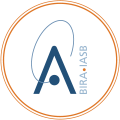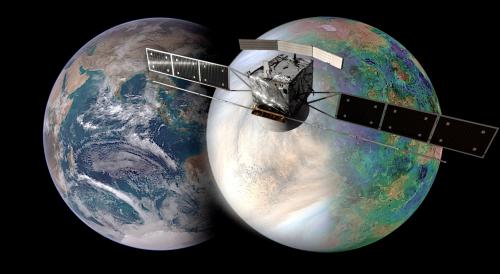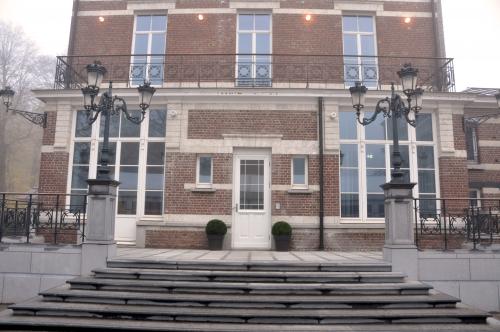New style of working
We were fortunately able to quietly climb out of the corona crisis during 2022, not without it leaving its mark. Digital acceleration has definitely set in. The return to the workplace has been accompanied by arrangements for more extensive teleworking, and the countless journeys to participate in meetings and scientific symposia have been replaced by an alternation between physical meetings, teleconferences, or hybrid meetings.
BIRA-IASB adapted smoothly to this new style of working. Clearly, the (partial) return to work was indispensable for many, either for their mental health and social engagement, or in order to not lose motivation for work, or both.
Effects of the war on our scientific activities
The war that broke out in Ukraine in February 2022 also affected BIRA-IASB as an institution, for some staff members in their collaborations with Russian and/or Ukrainian colleagues; for others, in their private lives. The biggest impacts on BIRA-IASB have been:
- delays of planned space missions—as cooperation with Russia for satellite launches has been suspended
- delays and cost increases on the supply of equipment (instruments or their components, IT equipment, etc.)
- increase in energy prices and the effects of inflation on staff salaries.
Despite helpful grants from the federal government to partially absorb these increased costs, we are struggling with a marked reduction in available resources. If this reduction continues, the current level of scientific activities will necessarily have to decline in the short to medium term.
Highlights excellent scientific results
Nevertheless, BIRA-IASB can present excellent scientific results in 2021-2022 as this report – which highlights only the most important achievements – clearly shows. In particular, we are proud that two new experiments with significant contributions from BIRA-IASB on board future ESA missions have been selected for further development, namely:
- the Venspec-H instrument on board EnVision
- the Sweeping-Langmuir probes proposed by BIRA-IASB for the Comet Interceptor mission.
BIRA-IASB’s contributions to the development, validation and operation of the Sentinel-5P mission provide a variety of important and internationally recognised results concerning global air quality, ozone and climate, making BIRA-IASB even stronger for its participation in the future Sentinel-4 and –5 atmosphere missions. Meanwhile, BIRA-IASB has also demonstrated itself in the first geostationary Korean satellite mission dedicated to air quality research and in the future EUMETSAT-led CO2M mission, the first European mission entirely focused on the detection and quantification of carbon dioxide and methane emissions, with a launch scheduled for 2026.
BIRA-IASB also plays an important role in the ESA Climate Change Initiative programme, the Copernicus Atmosphere Monitoring Service (CAMS) and Climate Change Service (C3S); the integration of BIRA-IASB’s model for stratospheric chemistry into the CAMS models will lead to a significant improvement of the CAMS products.
BIRA-IASB naturally also continues to play its leading role in the international atmospheric composition monitoring networks, partly integrated into the European research infrastructures ICOS (Integrated Carbon Observation System) and ACTRIS (Aerosol, Clouds and Trace gases Research InfraStructure). In the Space Weather area, BIRA-IASB has taken on the coordination of the European Space Weather Network (SWESNET).
Policymakers, citizens and students have not been forgotten: not only do we offer them information and training, but we also involve them directly in a number of research projects.
An important milestone from 2022 is the anchoring of the Belgian User Support and Operations Centre (B.USOC) – previously managed by BELSPO - within BIRA-IASB, thus ensuring the future of B.USOC after the winding down of its missions to support experiments aboard the International Space Station. A second important initiative is the creation of the Federal Climate Centre in November 2022: BIRA-IASB has made a significant effort in the working groups and committees that have developed the vision, mission, and management structure of this Centre. Third, we have put the Belgian Radiometric Characterization Laboratory (B.RCLab) on the map in Belgium.
So it is with a certain pride that I dare say that we, as an Institute, have so far miraculously survived the two recent major crises, even if it was a tough period for many staff members.
Fears regarding a shift in priorities and the resources allocated
Despite these excellent scientific results, even in crisis times, and despite the fact that BIRA-IASB is strong thanks to a close-knit group of dynamic and motivated staff members, I look to the future with some suspicion, even fear.
In 2021, there was hope for a revival of Federal Science Policy and more efficiency and autonomy in the management of Federal Scientific Institutions. In late 2022 - early 2023, I am sad to note the opposite. The bureaucratic (digital) paper mill is ever-increasing, just as the procedures are getting heavier and the controls are increasing. There is little sign of administrative simplication; just because some processes have been digitised does not make them simpler and/or more efficient!
Our autonomy is being cut back more and more. The functioning of the Federal Science Policy has not yet noticeably improved. Even the urgent renovation of our buildings is still pending.
It seems that scientific activities must be sacrificed in favour of a greater administrative and procedural burden. In my view, and in line with our mission, the first priority in BIRA-IASB should be the advancement of scientific work, and that is also the ambition of the staff we recruit for this purpose. Good management of the Institute is important, but it must first and foremost aim to efficiently support that scientific work. If management comes first and scientific work has to shift to second place or be hampered in return, we are doing the wrong thing.
I hope that my fears regarding a shift in priorities and the resources allocated to them are unfounded and that, in two years time, we will be able to present scientific results that are just as excellent and numerous, thanks to a motivated and dynamic team, and not at any cost!
Finally, I wish to thank and congratulate all BIRA-IASB staff for the wonderful results we are able to present today as an Institution, which we would like to share with you, dear readers, in this report.
Martine De Mazière
Director General a.i.


